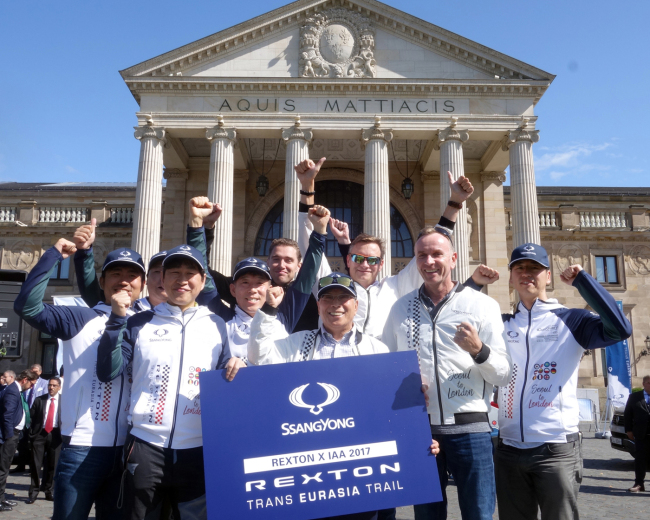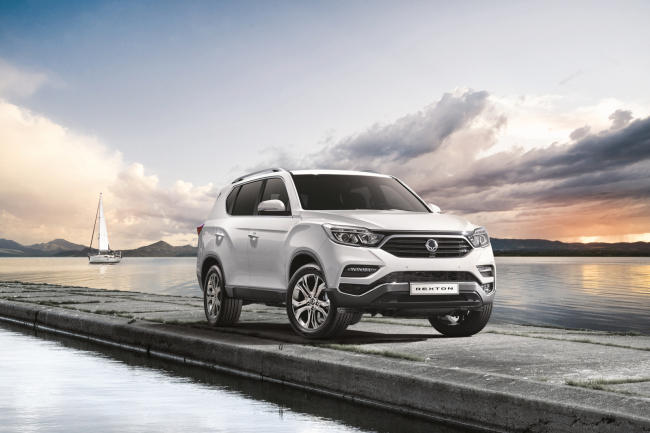SsangYong Motor aims to sell 6,000 units of G4 Rexton in Europe next year
By Kim Bo-gyungPublished : Sept. 12, 2017 - 15:40

SsangYong Motor, the local unit of India’s Mahindra & Mahindra, set next year’s target sales for the large-size G4 Rexton SUV at 6,000 units in the European market, its CEO Choi Johng-shik said Tuesday.
“Targeting Europe’s D-segment SUV market, we plan to sell 3,000 units of the G4 Rexton throughout the remaining four months of this year, and 5,000 units to 6,000 units next year,” said Choi during a press conference held in Wiesbaden, central western Germany.
“Local dealers say the vehicle is comparable to the BMW X5.”
The G4 Rexton is expected to be sold at an average price of 35,000 euros ($41,800) in Europe, which is higher than in Korea, where the model is priced between 33.5 million won and 45.5 million won.
The model was introduced to the European market at this week’s Frankfurt Motor Show.

As for the company’s plans to advance into China, Choi said there has been no progress made due to a change in the Chinese government’s stance asking the company to make capital investments.
The demand is a change from the previous agreement in March that SsangYong would supply vehicles while a Chinese company would take care of capital investments, according to Choi.
In October 2016, SsangYong Motor signed an agreement with Chinese automaker Shaanxi Automobile Group to establish a joint venture for SsangYong to build a factory there.
Lately there has been a change in the Chinese government’s approach to the auto market, according to a report by Lee Jae-il, an analyst in charge of automobiles at Eugene Investment & Securities.
It is gradually moving toward abolishing regulations requiring foreign carmakers to establish a joint venture with a Chinese company to conduct business there, in light of the technological advances of carmakers there. It has also been keeping a stricter watch on foreign auto parts makers to foster China’s homegrown auto parts companies.
Mandatory electric vehicle production imposed by the Chinese government is also a hurdle for SsangYong Motor, which currently does not produce EVs.
Acknowledging a change in motorists’ preference toward EVs, SsangYong Motor is set to roll out electrified vehicles by the end of 2019, Choi said.
SsangYong Motor, however, has not yet selected a battery supplier due to the high prices of batteries made by Korean companies.
This year SsangYong Motor will aim to sell 155,000 units, similar to the 155,844 units sold in 2016, the company said.
The automaker sold a total of 93,483 units between January and August this year, down 6.1 percent on-year.
By Kim Bo-gyung (lisakim425@heraldcorp.com)








![[Graphic News] More Koreans say they plan long-distance trips this year](http://res.heraldm.com/phpwas/restmb_idxmake.php?idx=644&simg=/content/image/2024/04/17/20240417050828_0.gif&u=)
![[KH Explains] Hyundai's full hybrid edge to pay off amid slow transition to pure EVs](http://res.heraldm.com/phpwas/restmb_idxmake.php?idx=644&simg=/content/image/2024/04/18/20240418050645_0.jpg&u=20240419100350)





![[From the Scene] Monks, Buddhists hail return of remains of Buddhas](http://res.heraldm.com/phpwas/restmb_idxmake.php?idx=652&simg=/content/image/2024/04/19/20240419050617_0.jpg&u=20240419175937)

![[KH Explains] Hyundai's full hybrid edge to pay off amid slow transition to pure EVs](http://res.heraldm.com/phpwas/restmb_idxmake.php?idx=652&simg=/content/image/2024/04/18/20240418050645_0.jpg&u=20240419100350)

![[Today’s K-pop] Illit drops debut single remix](http://res.heraldm.com/phpwas/restmb_idxmake.php?idx=642&simg=/content/image/2024/04/19/20240419050612_0.jpg&u=)